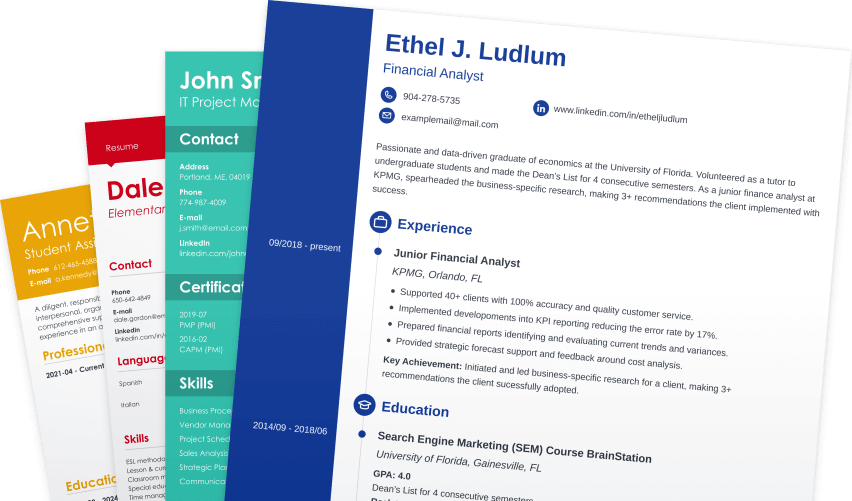

Job Interviews
Learn how to prepare for an interview and ace it. Find out what questions recruiters ask and how to answer them. Follow expert strategies and tips, go through the interviewing stage stress-free, and land that job. Each guide comes with real-life examples and pro tips from HR professionals.
Featured Articles
Job Interviews Articles
How to Describe Yourself in an Interview [With Examples]
“How would you describe yourself?” Don’t be fooled by this innocent-sounding question. There is a right answer. Learn how to describe yourself in an interview with these tips.
By Cory Streiff Feb 6, 2026
What Are Your Weaknesses: Job Interview Answer Examples
What are your weaknesses? An interview question not for the faint of heart. But it can be easier than you think—find out all about how to answer it below!
By Aleksandra Nazaruk Jan 28, 2026
Follow-Up Email After an Interview: 5 Examples & Tips
Learn how to write a follow-up email after an interview to keep the ball rolling. See a pro example of an interview follow-up email & check expert tips to boost your chances.
By Danuta Detyna, CPRW Jan 28, 2026
How To Accept a Job Offer + Email Template
How to accept a job offer like a pro? Well, it takes a bit more than simply saying "yes." Read on and learn everything you should know about accepting a job offer!
By Danuta Detyna, CPRW Dec 19, 2025
25 Common Nursing Interview Questions + Answers
The nursing job is right around the corner, but you're bombarded with nursing interview questions. Get your career off life support and face the nurse interview questions prepared.
By Tom Gerencer, CPRW Dec 19, 2025
25 Common Teacher Interview Questions + Answers
Time for a pop quiz. But this time, you're the one answering. Prepare for the most common teacher interview questions with our expert guide!
By Tom Gerencer, CPRW Dec 19, 2025
How to Answer 'What Motivates You?' in an Interview
The dreaded 'What motivates you?' question. Don't let it ruin your dreams! Learn how to reply to the 'What motivates you?' interview question in 2026.
By Maciej Tomaszewicz, CPRW Dec 19, 2025
25+ Common Job Interview Questions and Answers
Interview coming up, and you just don’t know what to expect? Here’s a compilation of the most common interview questions that you might hear and how to answer them.
By Aleksandra Nazaruk Dec 19, 2025
20 Common Phone Interview Questions and Answers
Got the dreaded phone interview coming up? No problem. Our guide gives some examples of phone interview questions and answers to get you ready in no time.
By Christian Eilers, CPRW Dec 19, 2025
60 Smart Questions to Ask in an Interview
Interviews are conversations, not interrogations. Pick good questions to ask in an interview, and you’ll start work on Monday. Here are the best questions to ask an interviewer.
By Christian Eilers, CPRW Dec 19, 2025
40 Interview Questions for Managers (Examples & Answers)
Psst. Your employees say you're the best manager they've ever had. Why don’t you tell us your secret while answering these tough interview questions for managers?
By Katarzyna Furman Nov 24, 2025
10 Good Reasons for Leaving a Job + Interview Answers
You've had your reasons to leave that job. But during a job interview you might want to stay positive. Learn how to explain your reasons for leaving a job in a beneficial way.
By Roma Kończak, CPRW Nov 12, 2025
How to Use the STAR Interview Method for Your Benefit
Wishing upon a star may not grant you the job you want. The STAR interview method is a safer bet! Learn to use it to impress recruiters when answering job interview questions.
By Roma Kończak, CPRW Nov 12, 2025
What Makes You Unique? 9 Sample Answers for Job Interviews
Are you stuck wondering "what makes me unique". Answering the what makes you unique interview question is easier than you think. Read on to craft your answer in advance!
By Tom Gerencer, CPRW Oct 21, 2025
50+ Best Job Interview Tips & Tricks That Get Jobs
The best job interview tips to turn any interview into a success. Last minutes before the meeting? Preparing well in advance? We've got it all.
By Christian Eilers, CPRW Oct 21, 2025
15+ Smart Questions to Ask at the End of an Interview
Every job interview is a two-way street. Pick the best questions to ask at the end of an interview to spot red flags and boost your chances of getting hired!
By Hanna Wołoszyn, CPRW Oct 21, 2025
What Is a Group Interview—Questions, Tips & How to Stand Out
You don’t want to feel like a third wheel during a group interview. So take a deep breath and learn how to prepare for a group interview to get the job of your dreams.
By Roma Kończak, CPRW Oct 21, 2025
“Tell Me About Yourself” Interview Questions & Answers
The way you introduce yourself to the recruiter is instrumental in landing the job. We’ll show you how to answer the “Tell me about yourself” interview question.
By Maciej Duszyński, CPRW Oct 21, 2025
Why Should We Hire You? Best Answers for Job Interviews
Why should we hire you? Why would you be a good fit for this position? These are tough interview questions. Use our sample why should we hire you answers and tips to succeed.
By Danuta Detyna, CPRW Oct 21, 2025
20+ Top Situational Interview Questions and Answers
Situational interview questions are as unpredictable as a game of roulette, but we'll ensure you hit the jackpot! Follow our guide and get ready to spin the wheel of success!
By Tom Gerencer, CPRW Oct 21, 2025
Answering “How Do You Handle Stress and Pressure?”
How do you handle stress and pressure? This interview question is hated by many. Learn how to answer it without admitting you enjoy imagining your audience in their birthday suit.
By Roma Kończak, CPRW Oct 21, 2025
Thank You Email After an Interview: Best Samples & Tips
The interview went well. What now? Instead of waiting impatiently, send a post-interview thank-you email that will convince them you're the best candidate out there.
By Danuta Detyna, CPRW Oct 7, 2025
Job Responsibilities Examples (to Use for Job Interviews)
In your resume and in job interviews, you need to know how to describe your current job responsibilities. Here's how to leverage your work duties to maximum effect.
By Maciej Tomaszewicz, CPRW Oct 7, 2025
How to Answer Tell Me Something That’s Not on Your Resume
How do you answer tell me something that is not on your resume? It’s tricky, but once you know why they’re asking, it’s a snap. See our tips, key steps, and example answers below.
By Tom Gerencer, CPRW Oct 7, 2025
How to Best Answer "Where Do You See Yourself in 5 Years?"
Here's how to answer the "Where Do You See Yourself in 5 Years?" interview question. Includes best answer examples and job interview tips from experts!
By Natalie Severt Oct 7, 2025






